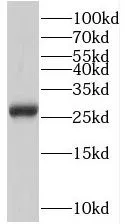FMN2 antibody - 100 µg
Host : Rabbit
Clonality: Polyclonal
Clone:
Isotype: IgG
Immunogen: formin 2
Purity: ≥95% as determined by SDS-PAGE
Form: Liquid
Molecular weight: 195 kDa
Uniprot: Q9NZ56
Gene id: 56776
Background: Required for asymmetric spindle positioning, asymmetric oocyte division and polar body extrusion during female germ cell meiosis(By similarity). Actin-binding protein that is involved in actin cytoskeleton assembly and reorganization. Acts as an actin nucleation factor and promotes assembly of actin filaments together with SPIRE1 and SPIRE2. Involved in intracellular vesicle transport along actin fibers, providing a novel link between actin cytoskeleton dynamics and intracellular transport. Plays a role in responses to DNA damage, cellular stress and hypoxia by protecting CDKN1A against degradation, and thereby plays a role in stress-induced cell cycle arrest. Protects cells against apoptosis by protecting CDKN1A against degradation.
Field of research: Neuroscience, Signal Transduction, Developmental biology
Storage conditions: PBS with 0.02% sodium azide and 50% glycerol pH 7.3, -20°C for 12 months(Avoid repeated freeze
thaw cycles.)
Applications: ELISA, IHC
Dilution: IHC: 1:50-1:500
Target: FMN2
Purification: Immunogen affinity purified
Reactivity: Human, Mouse

Clonality: Polyclonal
Clone:
Isotype: IgG
Immunogen: formin 2
Purity: ≥95% as determined by SDS-PAGE
Form: Liquid
Molecular weight: 195 kDa
Uniprot: Q9NZ56
Gene id: 56776
Background: Required for asymmetric spindle positioning, asymmetric oocyte division and polar body extrusion during female germ cell meiosis(By similarity). Actin-binding protein that is involved in actin cytoskeleton assembly and reorganization. Acts as an actin nucleation factor and promotes assembly of actin filaments together with SPIRE1 and SPIRE2. Involved in intracellular vesicle transport along actin fibers, providing a novel link between actin cytoskeleton dynamics and intracellular transport. Plays a role in responses to DNA damage, cellular stress and hypoxia by protecting CDKN1A against degradation, and thereby plays a role in stress-induced cell cycle arrest. Protects cells against apoptosis by protecting CDKN1A against degradation.
Field of research: Neuroscience, Signal Transduction, Developmental biology
Storage conditions: PBS with 0.02% sodium azide and 50% glycerol pH 7.3, -20°C for 12 months(Avoid repeated freeze
thaw cycles.)
Applications: ELISA, IHC
Dilution: IHC: 1:50-1:500
Target: FMN2
Purification: Immunogen affinity purified
Reactivity: Human, Mouse

